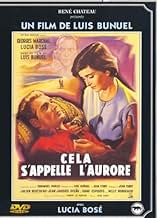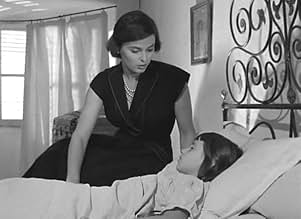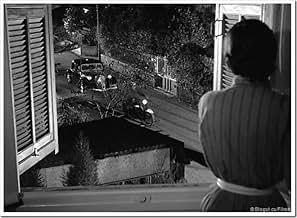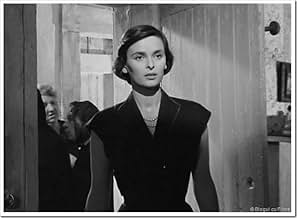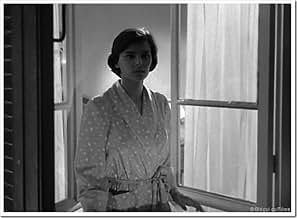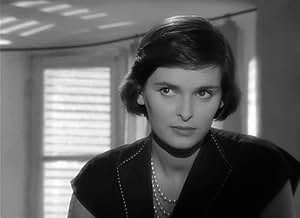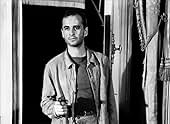AVALIAÇÃO DA IMDb
6,8/10
981
SUA AVALIAÇÃO
Numa ilha do Mediterrâneo, um honrado médico esconde um criminoso procurado. O médico logo é caçado por um comissário de polícia.Numa ilha do Mediterrâneo, um honrado médico esconde um criminoso procurado. O médico logo é caçado por um comissário de polícia.Numa ilha do Mediterrâneo, um honrado médico esconde um criminoso procurado. O médico logo é caçado por um comissário de polícia.
- Direção
- Roteiristas
- Artistas
Lucia Bosè
- Clara
- (as Lucia Bosé)
Christine Davray
- Young Girl
- (não creditado)
Avaliações em destaque
In Corsica, the altruistic Dr. Valerio (Georges Marchal) is the only doctor in the island and is always busy with his many clients. His spoiled wife Angela (Nelly Borgeaud) is feeling bored with her tedious life and wants to return to Nice. Dr. Valerio is a friend of Sandro Galli (Giani Esposito), who is in deep love with his wife Magda (Brigitte Elloy) that is very ill and needs to rest. Sandro is neglecting his duties of the caretaker of the farm of the wealthy and powerful Gorzone (Jean-Jacques Delbo) to give more attention to his wife. Angela has a nervous breakdown and decides to travel to Nice to spend some time with her father.
When the Chief of Police Fasaro (Julien Bertheau) summons Dr. Valerio to examine a little girl that was raped by her grandfather, he meets the gorgeous and elegant widow Clara Bernacci (Lucia Bosé). They immediately fall in love with each other and have a love affair. Meanwhile, Gorzone fires Sandro and hires another caretaker. Dr. Valerio visits Gorzone and asks him to hire Sandro back, and the man agrees but he lies to Dr. Valerio. When the new employee arrives at Sandro's home, he transports Clara in a wagon to the house of his friend Pietro (Robert Le Fort). However she does not resist to the journey and dies. Sandro gets a gun and goes to the manor of Gorzone to revenge the death of his beloved wife.
"Cela s'Appelle l'Aurore" is another wonderful film of Luis Buñuel with a dramatic love story with romance, fight of classes and revenge. Buñuel makes an accessible film without the use of surreal imagery or hidden messages. However his style is present in the critic to the behavior of the upper classes and the hypocrisy of the Catholic Church with the sequence when Sandro arrives at Gorzone's mansion and the priest asks him to go back home. Georges Marchal has a magnificent performance in a beautiful role of a doctor that helps the poor ones. The remarkable beauty, class and elegance of Lucia Bosé is still very impressive in the present days. My vote is eight.
Title (Brazil): "Assim é a Aurora" ("Thus Is the Dawn")
When the Chief of Police Fasaro (Julien Bertheau) summons Dr. Valerio to examine a little girl that was raped by her grandfather, he meets the gorgeous and elegant widow Clara Bernacci (Lucia Bosé). They immediately fall in love with each other and have a love affair. Meanwhile, Gorzone fires Sandro and hires another caretaker. Dr. Valerio visits Gorzone and asks him to hire Sandro back, and the man agrees but he lies to Dr. Valerio. When the new employee arrives at Sandro's home, he transports Clara in a wagon to the house of his friend Pietro (Robert Le Fort). However she does not resist to the journey and dies. Sandro gets a gun and goes to the manor of Gorzone to revenge the death of his beloved wife.
"Cela s'Appelle l'Aurore" is another wonderful film of Luis Buñuel with a dramatic love story with romance, fight of classes and revenge. Buñuel makes an accessible film without the use of surreal imagery or hidden messages. However his style is present in the critic to the behavior of the upper classes and the hypocrisy of the Catholic Church with the sequence when Sandro arrives at Gorzone's mansion and the priest asks him to go back home. Georges Marchal has a magnificent performance in a beautiful role of a doctor that helps the poor ones. The remarkable beauty, class and elegance of Lucia Bosé is still very impressive in the present days. My vote is eight.
Title (Brazil): "Assim é a Aurora" ("Thus Is the Dawn")
This is Luis Bunuel's first European film for twenty-three years, badly received on its release and since banished to the realms of cinematic obscurity, unfairly so.
Adapted by Bunuel and Jean Ferry from a novel by Emmanuelle Robles described by the director as 'a story so perfectly pure', this is one of his most conventional and indeed rigorous films in which his customary anti-bourgeois stance is tempered by a compassion unusual in his output.
His excellent cast is headed by Georges Marchal, a hunk who can also act and who convinces as a doctor with the best intentions struggling to break free from his bourgeois mindset whilst Lucia Bosé as his lover does not have her strongest role but certainly her most sympathetic. The police commissioner is written as a far from one-dimensional character and is splendidly portrayed by Julien Bertheau. Both Marchal and Bertheau were of course to feature more than once for this director whilst in a relatively minor role is veteran Gaston Modot who had appeared in his infamous 'L' Age D'Or' thirty-five years earlier.
In what could have been merely a melodrama, we have here not only Bunuel the cinéaste but Bunuel the humanist.
Adapted by Bunuel and Jean Ferry from a novel by Emmanuelle Robles described by the director as 'a story so perfectly pure', this is one of his most conventional and indeed rigorous films in which his customary anti-bourgeois stance is tempered by a compassion unusual in his output.
His excellent cast is headed by Georges Marchal, a hunk who can also act and who convinces as a doctor with the best intentions struggling to break free from his bourgeois mindset whilst Lucia Bosé as his lover does not have her strongest role but certainly her most sympathetic. The police commissioner is written as a far from one-dimensional character and is splendidly portrayed by Julien Bertheau. Both Marchal and Bertheau were of course to feature more than once for this director whilst in a relatively minor role is veteran Gaston Modot who had appeared in his infamous 'L' Age D'Or' thirty-five years earlier.
In what could have been merely a melodrama, we have here not only Bunuel the cinéaste but Bunuel the humanist.
This must be one of Bunuel's most accessible works.It's often hard to find the master's touch but ,although it sometimes recalls Italian neorealism (all that concerns Sandro's family),the picture of the Christ -the only element of surrealism in the whole work- signals Bunuel's inimitable talent.
Georges Marchal,who was good friend with the director, portrays a charitable doctor,almost what we could call a secular saint.He's got a practical mind and he does what Nazarin and Viridiana will try to do in the name of God .He is l'Honnête Homme ,in the Bunuelesque sense of the term.Religion is not part of his life and however ,he is always around when it comes to lending a hand to his fellow men.
The man of God ,the priest is also here ,but he's in the boss's bourgeois house : when the distraught Sandro (Gianni Esposito) comes to him,he tells him "go back home,my son" ,when the poor man has got no more house or wife.
The movie tells the story of a man leaving slowly but inexorably the discreet charm of the bourgeoisie.First step is falling for a woman who is not part of his milieu (Lucia Bosé).Second step is breaking up with his wife (and his father-in-law) .Third and final step is refusing to become an informer and finally joining his friends ,all working class men .
Georges Marchal gives an effective warm performance.His character is very close to the one he will play in Bunuel's French follow up "La Mort en Ce Jardin".That raider might possibly be the doctor estranged from his country,milieu and family.Both have got a practical mind: in "La Mort En ce Jardin", Marchal lights a fire with the pages of the Bible.
Bunuel's obsessions are still here : the mistreated donkey,the girl raped by her grandfather,the boys playing at soldiers and blindfolding one of them before shooting him.But they do not seem to matter much next to the hero's line of thought :this be called the dawn of his life.
Georges Marchal,who was good friend with the director, portrays a charitable doctor,almost what we could call a secular saint.He's got a practical mind and he does what Nazarin and Viridiana will try to do in the name of God .He is l'Honnête Homme ,in the Bunuelesque sense of the term.Religion is not part of his life and however ,he is always around when it comes to lending a hand to his fellow men.
The man of God ,the priest is also here ,but he's in the boss's bourgeois house : when the distraught Sandro (Gianni Esposito) comes to him,he tells him "go back home,my son" ,when the poor man has got no more house or wife.
The movie tells the story of a man leaving slowly but inexorably the discreet charm of the bourgeoisie.First step is falling for a woman who is not part of his milieu (Lucia Bosé).Second step is breaking up with his wife (and his father-in-law) .Third and final step is refusing to become an informer and finally joining his friends ,all working class men .
Georges Marchal gives an effective warm performance.His character is very close to the one he will play in Bunuel's French follow up "La Mort en Ce Jardin".That raider might possibly be the doctor estranged from his country,milieu and family.Both have got a practical mind: in "La Mort En ce Jardin", Marchal lights a fire with the pages of the Bible.
Bunuel's obsessions are still here : the mistreated donkey,the girl raped by her grandfather,the boys playing at soldiers and blindfolding one of them before shooting him.But they do not seem to matter much next to the hero's line of thought :this be called the dawn of his life.
Você sabia?
- CuriosidadesThe police commissioner Fasaro, repressive figure representing the established order, has on the desk of his office a volume of plays by Paul Claudel, a prominent Catholic writer. The book appears franked by a pair of handcuffs, insinuating the repulse that Luis Buñuel felt both towards the French author and his ideology. According to Buñuel himself in his memoirs, entitled "My Last Sigh", Paul Claudel's daughter wrote him a letter insulting the director for having shown in this film a book by his father next to a pair of handcuffs.
- ConexõesReferenced in Carmen de Godard (1983)
Principais escolhas
Faça login para avaliar e ver a lista de recomendações personalizadas
Detalhes
- Data de lançamento
- Países de origem
- Central de atendimento oficial
- Idiomas
- Também conhecido como
- This is Called Dawn
- Locações de filme
- Bastia, Haute-Corse, França(main location)
- Empresas de produção
- Consulte mais créditos da empresa na IMDbPro
- Tempo de duração1 hora 42 minutos
- Cor
- Mixagem de som
- Proporção
- 1.37 : 1
Contribua para esta página
Sugerir uma alteração ou adicionar conteúdo ausente

Principal brecha
By what name was Assim é a Aurora (1956) officially released in Canada in English?
Responda
